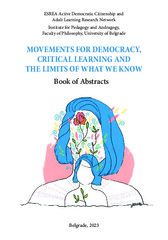Приказ основних података о документу
Navigating the Post-Covid Era: The Challenge of Educating for Democratic Citizenship
| dc.creator | Popović, Katarina | |
| dc.creator | Nišavić, Ivan | |
| dc.date.accessioned | 2024-01-22T11:06:06Z | |
| dc.date.available | 2024-01-22T11:06:06Z | |
| dc.date.issued | 2023 | |
| dc.identifier.isbn | 978-86-80712-50-5 | |
| dc.identifier.uri | http://rifdt.instifdt.bg.ac.rs/123456789/3759 | |
| dc.description.abstract | The COVID-19 pandemic has had a profound impact on democratic governance in many countries around the world, with emergency measures taken to combat the spread of the virus often used as a pretext for authoritarian leaders to consolidate power and undermine democratic institutions. As a result, some governments have suspended constitutional rights, restricted freedom of expression and assembly, and cracked down on dissenting voices, exploiting the pandemic to limit democratic participation and engagement. The closure of public spaces, limitations on freedom of speech, and the suspension of elections have also contributed significantly to the erosion of democratic values during the COVID-19 pandemic. Moreover, the conflict between efforts to fight the pandemic through lockdowns and limitations on movements and gathering, and the need for citizens to be active and critical, created a tension between public health and democratic values. While some restrictions may have been necessary to curb the spread of the virus and protect public health, these measures have also limited citizens’ ability to engage in critical dialogue about government policies, voice dissenting opinions, and participate in democratic processes. This tension highlights the need to strike a balance between di- verse public values, and underscores the challenges posed by the pandemic to democratic governance. Additionally, the public discourse in many countries has become increasingly polarized, with alternative opinions often shamed or silenced, preventing constructive criticism of governmental measures and limiting the ability of citizens to engage in democratic processes. The paper will use the data from international organizations such as Amnesty International, Freedom House, and the Varieties of Democracy Project, to indicate the ways in which the pandemic has had a negative impact on democracy around the world. This data will be used to provide a broad overview of the challenges faced by democratic institutions and processes in the context of COVID-19. Next, the paper will draw on the ideas of Noam Chomsky and Hahrie Han to analyze the specific challenges posed by COVID-19 for democratic citizenship. Chomsky’s critiques of authoritarianism and state power will be used to examine the ways in which emergency measures taken in response to the pandemic have been used as a pretext for consolidating power and undermining democratic institutions. Finally, Han’s work on civic engagement and collective action will be used to explore the challenges and dilemmas facing citizens in the context of COVID-19, including limitations on expression and gathering, as well as the need for active and critical citizenship in the face of emergency measures taken to combat the spread of the virus. In conclusion, the challenges posed by the COVID-19 pandemic have brought to light the complex and multifaceted nature of democratic governance. As the world continues to grapple with the ongoing effects of various crises, as well as those that may arise in the future, the tension between collective action and individual freedoms remains a crucial issue that requires further exploration. Finding a balance between a harmonized social response and the plurality of voices that democracy needs is a complex and ongoing challenge. Furthermore, shaping education for democratic citizenship based on an active and critical approach without undermining social trust and legitimacy is another significant challenge that requires careful consideration. | sr |
| dc.language.iso | en | sr |
| dc.publisher | Institute for Pedagogy and Andragogy, Faculty of Philosophy, University of Belgrade | sr |
| dc.relation | "info:eu-repo/grantAgreement/MESTD/inst-2020/200025/RS//" | sr |
| dc.rights | openAccess | sr |
| dc.rights.uri | https://creativecommons.org/licenses/by/4.0/ | |
| dc.source | Book of Abstracts: Movements for Democracy, Critical Learning and the Limits of What We Know | sr |
| dc.title | Navigating the Post-Covid Era: The Challenge of Educating for Democratic Citizenship | sr |
| dc.type | conferenceObject | sr |
| dc.rights.license | BY | sr |
| dc.citation.spage | 38 | |
| dc.citation.epage | 39 | |
| dc.type.version | publishedVersion | sr |
| dc.identifier.fulltext | http://rifdt.instifdt.bg.ac.rs/bitstream/id/13610/bitstream_13610.pdf | |
| dc.identifier.rcub | https://hdl.handle.net/21.15107/rcub_rifdt_3759 |

